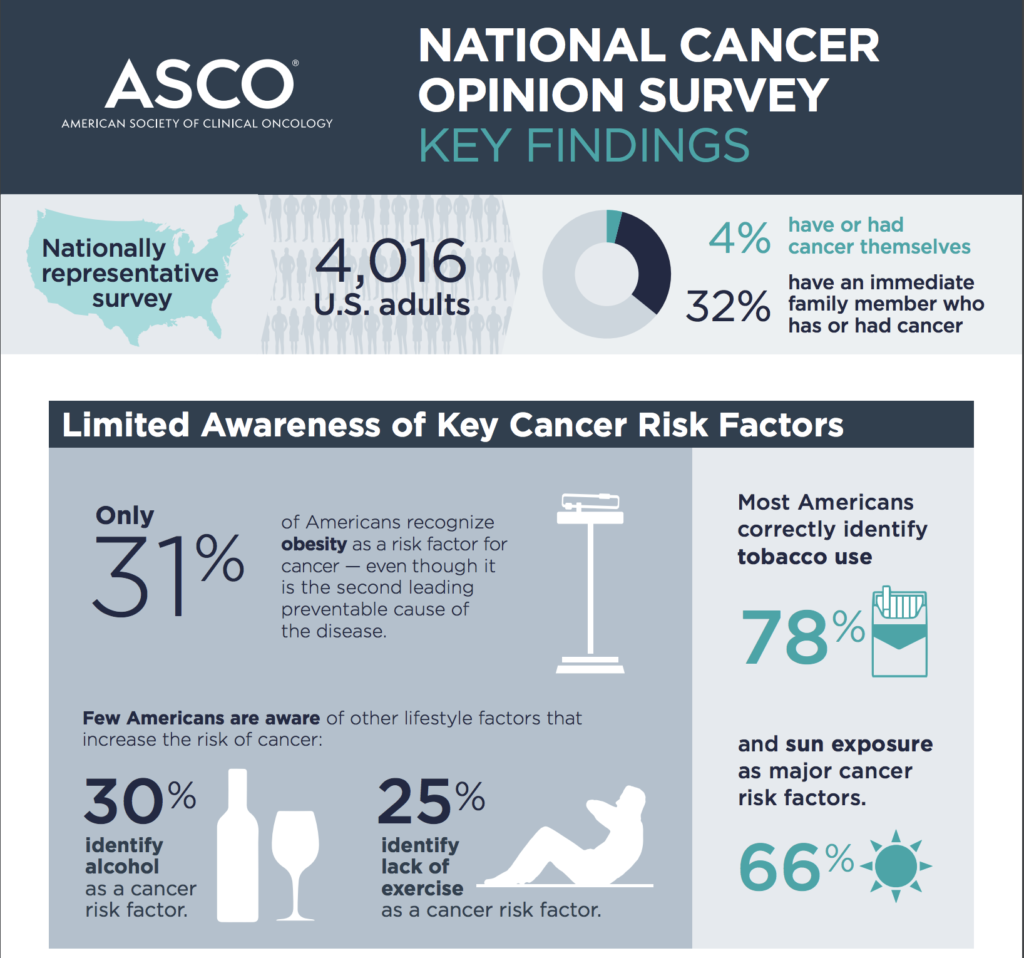
From the ASCO survey infographic
On Nov. 7, the American Society of Clinical Oncology (ASCO) released a groundbreaking policy statement on the connection between alcohol use and cancer risk. Lead author and Policy Committee member Noelle LoConte, MD, briefed the committee on the statement’s key points.
Put simply, the more alcohol a person drinks, the greater their risk for certain cancers.
Background
In a recent ASCO survey, 70% of people, including providers, did not know alcohol increases cancer risk. LoConte was moved to write the ASCO statement when she realized providers’ lack of knowledge meant many doctors were unable to correctly note on death certificates which cancer deaths may have been alcohol-related.
The ASCO statement is designed to raise awareness, promote research, and push forward policy changes. “When people understand the connection between alcohol and cancer, they are more likely to support policy change,” said Courtney Harris, policy coordinator for the WI Comprehensive Cancer Control Program.
Alcohol is currently linked to seven kinds of cancer: mouth and throat cancer, larynx cancer, esophageal cancer, liver cancer, breast cancer, and colon cancer. LoConte expects pancreatic, gastric, and lung cancers soon will be added to that list.
On average, alcohol causes more than 5% of cancer deaths worldwide and almost 4% in the US. Risk rises with level of use. For example, among heavy drinkers, the risk of mouth and throat cancer is five times greater than for nondrinkers.
The ASCO statement reviews the mechanisms for how alcohol causes cancer and addresses barriers such as:
- Conflicting data regarding the “heart health” of moderate wine consumption. This has been mostly debunked, but it remains a common industry message to distract from the negative health consequences of drinking.
- Alcohol use among physicians may make them less likely to talk with patients about alcohol risks, similar to how overweight doctors can be less likely to discuss risks of obesity with patients.
Recommendations
The statement suggests key research areas, including:
- How does a change in drinking habits affect a patient’s rate of recurrence?
- How does alcohol affect things such as chemotherapy, radiation, oral medication, or hormonal therapies?
- What clinical interventions can providers use to reduce alcohol use?
In addition, ASCO’s policy recommendations include:
- Regulating alcohol outlet density;
- Increasing alcohol taxes and prices;
- Enhancing enforcement of laws prohibiting sales to minors (< age 21); and
- Supporting efforts to eliminate “pink washing” – the use of the color pink or pink ribbons to market products associated with breast cancer.
Julia Sherman from the WI Alcohol Policy Project reviewed opportunities to enact ASCO’s policy recommendations in Wisconsin, highlighting the significant local control municipalities have over alcohol outlet licensing, and an opportunity to add state funding for municipalities to enforce alcohol drinking age laws.
However, state and federal policymakers have offered proposals that contradict ASCO’s recommendations and could increase both excessive alcohol use and the alcohol-related cancer burden – including a state proposal to lower the minimum legal drinking age, and a little-known provision in the Republican tax overhaul that would reduce alcohol taxes.
Response
The media response to ASCO’s statement was overwhelming, with LoConte granting high-profile interviews to the New York Times, the Wisconsin State Journal, and Time magazine.
However, both LoConte and Sherman discussed the strong pushback they’ve received from not only the alcohol industry, but also colleagues and the general public.
“People clearly like their alcohol and don’t want to be told about the negative health effects,” said LoConte. “The feedback I get is, ‘everything is a carcinogen, so who cares.’ But with alcohol, ethanol is converted into a known carcinogen; it’s a no-brainer. Our statement is not, ‘Don’t have fun,’ it’s, ‘Know the risks.’”
Bottom line
Remember these talking points when discussing the alcohol and cancer link with patients, colleagues, and other constituencies:
- Alcohol use increases the risk of at least seven different cancers.
- Even low levels of drinking can increase risk, but the risk is greatest with heavy, long-term use.
- By reducing excessive drinking, we decrease the burden of cancer.
- To reduce your cancer risk, drink less. If you don’t drink, don’t start.
The ASCO statement represents a major step forward in advancing Priority 3 of the WI CCC Plan.
